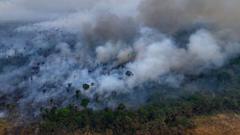In 2024, the world saw the fastest recorded rate of tropical forest destruction, primarily due to wildfires exacerbated by climate change. While Southeast Asia shows signs of progress in forest conservation, the Amazon faces critical risk as experts warn of a potential "tipping point."
Record Deforestation in Tropical Forests Sparks Urgent Climate Concerns

Record Deforestation in Tropical Forests Sparks Urgent Climate Concerns
A new study reveals an alarming increase in tropical forest loss, driven primarily by wildfire, prompting urgent discussions on climate change resilience.
The world's tropical forests, which are essential for combating climate change, have experienced unprecedented loss according to recent satellite data. An estimated 67,000 sq km (26,000 sq mi) of these vital ecosystems disappeared in 2024—an area nearly equivalent to the Republic of Ireland, translating to 18 football fields lost every minute.
Wildfires have overtaken agricultural land clearances as the leading cause of deforestation, with the Amazon suffering greatly amid a record drought. Conversely, Southeast Asia witnessed some positive developments, as governmental policies have reduced deforestation rates, showcasing a successful collaborative approach.
The role of tropical rainforests is crucial; they sequester significant amounts of carbon in their biomass and soil. The alarming rate of deforestation raises serious concerns about their resilience in an increasingly warm world. Experts, like Prof. Matthew Hansen of the University of Maryland's GLAD laboratory, suggest that some forests, particularly the Amazon, may be nearing a "tipping point" for irreversible decline.
"The data indicates that the possibility of 'savannisation'—where lush tropical forests transition to savanna—is becoming more plausible," Hansen remarked. A related study warns that significant dieback of the Amazon could occur if global warming surpasses the 1.5°C threshold set by international agreements. Such an outcome would not only jeopardize the myriad of species that inhabit these biodiverse ecosystems but would also reverberate globally, worsening climate conditions.
During the previous year, the Amazon faced its worst drought on record, intensified by both climate change and the El Niño weather pattern. The resultant fires released massive quantities of carbon dioxide, negating the rainforest's role as a carbon sink. Experts are noting a shift towards fires being not just linked to agricultural land clearing, but rather as part of an emerging and intense climate feedback loop.
Ultimately, 2024 recorded the loss of primary tropical forests, contributing 3.1 billion tonnes of greenhouse gases into the atmosphere—approximately equivalent to all emissions generated by the European Union.
In a notable contrast, regions in Southeast Asia like Indonesia have shown slight improvements; their primary forest loss decreased by 11% compared to the previous year, aided by policy measures against burning. Elizabeth Goldman, co-director of Global Forest Watch at WRI, attributed this success to effective governance and community enforcement of no-burn laws.
While some countries, such as Brazil, had achieved previous successes in forest conservation, they have seen a resurgence in forest loss due to destabilized policies since 2014. The message from researchers is clear: sustained and consistent policies are imperative for meaningful environmental protection.
Looking ahead, the upcoming UN climate summit COP30 in the Amazon is seen as a pivotal moment for the global community to address forest conservation strategies. One promising proposal is to create financial incentives for countries that preserve their forests, which could shift the economic dynamics that currently favor deforestation. "We must transition from a system that profits from cutting down trees to one that values and rewards their conservation," stated Rod Taylor from the World Resources Institute.




















